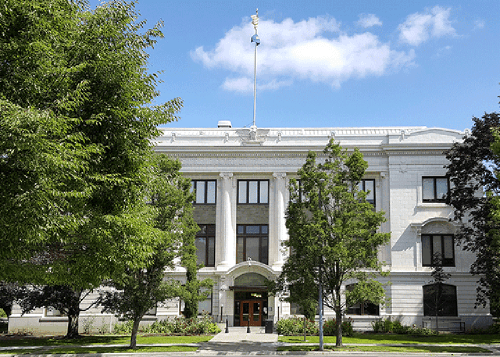Oregon Supreme Court declines to give ordinary people same libel protection as media
Published 11:41 pm Saturday, July 9, 2022

- The Oregon Supreme Court Building in Salem, home to the Court of Appeals and the Supreme Court.
Merchants irked by online reviews will still have an open lane to file libel lawsuits against their critics, the Oregon Supreme Court signaled, while media organizations will remain relatively secure against such defamation claims.
In a closely watched ruling, the state’s highest court declined to extend certain free speech protections available to the media to ordinary people, batting down arguments that anyone with an internet connection and an opinion now acts as a journalist.
While the decision two weeks ago has broader implications, the case at hand stems from a Jackson County Circuit Court lawsuit between dueling piano stores in Medford.
In 2013, Piano Studio and Showcase owner Tom Lowell sued competitor Artistic Piano after its general manager, Matthew Wright, allegedly posted a phony review on Google claiming the Piano Studio store “smelled like grandma’s attic” and that the business “can’t be trusted,” according to court records.
Circuit Judge Dan Bunch found in favor of Artistic Piano without a trial in 2016, noting the online review had been deleted before it could be documented and saying he couldn’t issue a ruling without an exact copy.
Lowell appealed and won, sending the case to the Oregon Supreme Court.
Free speech advocates hoped the state’s high court would seize the opportunity to change Oregon law, which currently offers separate, tougher standards to prove defamation suits against the media. Successful cases against the media must show “actual malice” — that a falsehood was published on purpose or with reckless disregard for the truth.
Libel suits filed against a regular person can succeed merely if the statements are proven untruthful.
Oregon’s double standard is out of step with the law in most other states, said Lewis & Clark law professor emeritus William Funk, as well as the interpretation in federal court in Oregon, which makes no distinction between media and nonmedia writers.
“If you file a libel suit in a federal court in Oregon, then you will get a different constitutional decision than if you file in Oregon state court, which just doesn’t make any sense,” Funk said.
The U.S. Supreme Court, however, hasn’t ruled definitively on the matter.
Funk joined two other Oregon law professors, the Electronic Frontier Foundation, University of California, Los Angeles, law professor Eugene Volokh and appellate lawyer Howard Bashman in a friend of the court brief seeking to extend the “actual malice” standard to all defamation cases on topics of public concern.
Justice Pro Tempore Lynn Nakamoto declined to do so.
“Plaintiff will not be subject to a heightened proof-of-fault requirement … that apply to media defendants in defamation cases,” Nakamoto wrote.
The justice acknowledged the criticism, but said the case “did not offer an opportunity for careful examination” of the fine line between web users and institutional journalists.
“(We cannot) destabilize over 40 years of precedent on the strength of a few hypotheticals and some abstract concerns about modernity,” she wrote.
Nakamoto returned the case to the lower court, saying the exact text of the review wasn’t necessary to proceed. In a separate opinion, Justices Thomas Balmer and Christopher Garrett said they would overturn the double standard.
Lowell, 68, said he was pleased the court had seen the distinction between journalistic commentary and what he called a “cybersmear” campaign by a rival.
“How could letting people get away with publicizing false facts be in the public interest?” he said.
A lawyer for Artistic Piano didn’t respond to a request for comment.
The Oregon Supreme Court in 2016 previously sided with a consumer who wrote a scathing online review of a wedding venue, but only after determining the man had posted his negative opinions, not assertions of fact.









